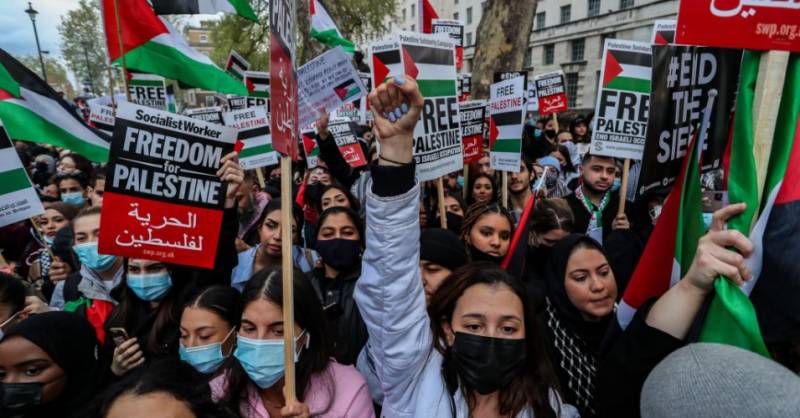
As I write this, Israel’s latest assault on Gaza has claimed more than a hundred Palestinian lives. The immediate context of this senseless violence is the ongoing dispossession of Palestinian families from the Sheikh Jarrah neighbourhood in East Jerusalem. However Israel opportunistically chose to distract attention from an acute political crisis at home to begin its latest expansionist assault right at the end of the fasting month of Ramazan coinciding with the 73rd anniversary of its founding in 1948.
Moreover, today is the 23rd 'Nakba Day' commemorating the forced and brutal expulsion of Palestinians from their historic ancestral land a day after the Zionist state of Israel was born, 73 years ago. Thus the Palestinians in doing so became the additional, unwilling and unintentional victims of the Holocaust.
Within a few months, more than 800,000 Palestinians had been deported and more than 500 of their villages had been turned to rubble.
Those villages, where olive, fig, almond and other fruit trees grew, now lie buried under highways, shopping malls and amusement parks. They are dead and unnamed on the map rechristened by the Government Names Committee.
Not much of Palestine is left. The 2000 years of persecution suffered by the Jewish people was invoked to justify this implacable gluttony, complete with property titles granted by the Bible.
Persecuting Jews had always been a European sport. Now the Palestinians are paying the bill.
The distinguished Urdu poet Ishrat Afreen has just written a heart-rending dirge for Palestine in the wake of the latest brutalization of Gaza. Titled Falastin Ka Nauha, the poem juxtaposes the anticipation of the Eid moon and the festivity following it in the rest of the Muslim world with the tragedy and pain of the suffering Palestinians, for whom the Eid moon has brought only misery.
Afreen deftly compares this with the helplessness of the martyrs of Karbala, acidly noting in the finale that:
Jang jahalat nafrat ghurbat
Apni Eid ka yeh tohfa hai
Afreen is the deserved successor of the likes of Kishwar Naheed and Fahmida Riaz in our own time. She completed a half-century of her landmark poetic journey on April 30 last month. Her latest poem marks her as one of the most urgent Urdu voices of her time, putting her in direct conversation with her illustrious forebears of the Progressive Writers Movement in the last century; something which is rare among her own contemporaries. The original Urdu text of the poem is followed by my humble English translation.
چاند کا اتنا شور مچا ہے اپنا چاند کہاں نکلا ہے
اپنی عید کدھر آئی ہے اپنا فاقہ کب ٹوٹا ہے
اپنے بچے تو بھوکے ہیں اپنا مستقبل ننگا ہے
اپنی جھولی تو خالی ہے اپنا چولہا تو ٹھنڈا ہے
تم چاہو تو عید منالو اپنا ہر دن عاشورہ ہے
تم چاہے منہ میٹھا کرلو اپنا تو کنبہ پیاسا ہے
اپنے پیارےمقتل میں ہیں اپنا ہر خیمہ جلتا ہے
اپنے لئے تو اب ہر بستی کوفہ ہے یا کرب و بلا ہے
کاش سنائی دے تم کو بھی گھر گھر جو ماتم برپا ہے
کاش دکھائی دے تم کو بھی ہر گھر ایک عزا خانہ ہے
جنگ جہالت نفرت غربت اپنی عید کا یہ تحفہ ہے
(So much commotion for the Eid moon
Has our moon emerged oh so soon
Whence has our Eid arrived
Only starvation has thrived
Our children very much suffer from hunger
Naked is our very future
My pouch is empty
My stove is cold
You can celebrate Eid if you want
Here every day is Ashura
If you want you can give yourself a treat
My family very much lies thirsty and beat
My beloveds are at the place of execution
Every tent of mine burns in arson
Now for me every village
Is agony and calamity or Kufa’s pillage
I wish that you too hear often
That every home is in lamentation
I wish that you too could see
Every house is a mourning repository
War, ignorance, hate, poverty
Are the gifts this Eid has bequeathed to me.)
Moreover, today is the 23rd 'Nakba Day' commemorating the forced and brutal expulsion of Palestinians from their historic ancestral land a day after the Zionist state of Israel was born, 73 years ago. Thus the Palestinians in doing so became the additional, unwilling and unintentional victims of the Holocaust.
Within a few months, more than 800,000 Palestinians had been deported and more than 500 of their villages had been turned to rubble.
Those villages, where olive, fig, almond and other fruit trees grew, now lie buried under highways, shopping malls and amusement parks. They are dead and unnamed on the map rechristened by the Government Names Committee.
Not much of Palestine is left. The 2000 years of persecution suffered by the Jewish people was invoked to justify this implacable gluttony, complete with property titles granted by the Bible.
Persecuting Jews had always been a European sport. Now the Palestinians are paying the bill.
The distinguished Urdu poet Ishrat Afreen has just written a heart-rending dirge for Palestine in the wake of the latest brutalization of Gaza. Titled Falastin Ka Nauha, the poem juxtaposes the anticipation of the Eid moon and the festivity following it in the rest of the Muslim world with the tragedy and pain of the suffering Palestinians, for whom the Eid moon has brought only misery.

Afreen deftly compares this with the helplessness of the martyrs of Karbala, acidly noting in the finale that:
Jang jahalat nafrat ghurbat
Apni Eid ka yeh tohfa hai
Afreen is the deserved successor of the likes of Kishwar Naheed and Fahmida Riaz in our own time. She completed a half-century of her landmark poetic journey on April 30 last month. Her latest poem marks her as one of the most urgent Urdu voices of her time, putting her in direct conversation with her illustrious forebears of the Progressive Writers Movement in the last century; something which is rare among her own contemporaries. The original Urdu text of the poem is followed by my humble English translation.
چاند کا اتنا شور مچا ہے اپنا چاند کہاں نکلا ہے
اپنی عید کدھر آئی ہے اپنا فاقہ کب ٹوٹا ہے
اپنے بچے تو بھوکے ہیں اپنا مستقبل ننگا ہے
اپنی جھولی تو خالی ہے اپنا چولہا تو ٹھنڈا ہے
تم چاہو تو عید منالو اپنا ہر دن عاشورہ ہے
تم چاہے منہ میٹھا کرلو اپنا تو کنبہ پیاسا ہے
اپنے پیارےمقتل میں ہیں اپنا ہر خیمہ جلتا ہے
اپنے لئے تو اب ہر بستی کوفہ ہے یا کرب و بلا ہے
کاش سنائی دے تم کو بھی گھر گھر جو ماتم برپا ہے
کاش دکھائی دے تم کو بھی ہر گھر ایک عزا خانہ ہے
جنگ جہالت نفرت غربت اپنی عید کا یہ تحفہ ہے
(So much commotion for the Eid moon
Has our moon emerged oh so soon
Whence has our Eid arrived
Only starvation has thrived
Our children very much suffer from hunger
Naked is our very future
My pouch is empty
My stove is cold
You can celebrate Eid if you want
Here every day is Ashura
If you want you can give yourself a treat
My family very much lies thirsty and beat
My beloveds are at the place of execution
Every tent of mine burns in arson
Now for me every village
Is agony and calamity or Kufa’s pillage
I wish that you too hear often
That every home is in lamentation
I wish that you too could see
Every house is a mourning repository
War, ignorance, hate, poverty
Are the gifts this Eid has bequeathed to me.)
